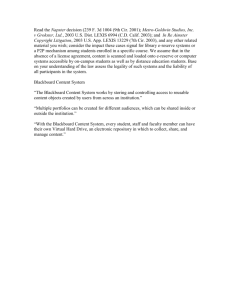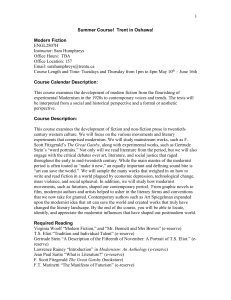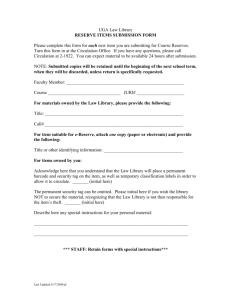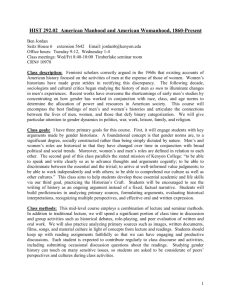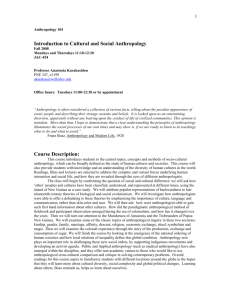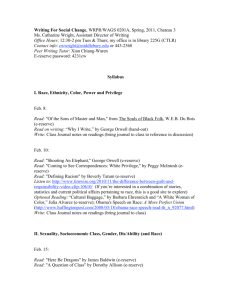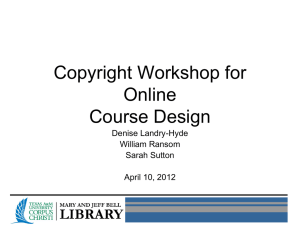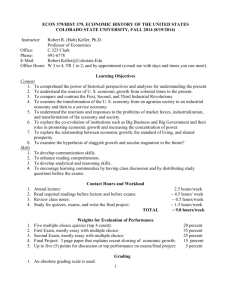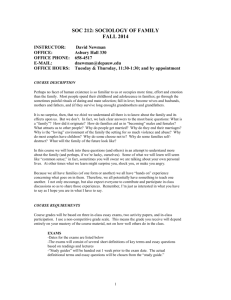- UNT Anthropology
advertisement
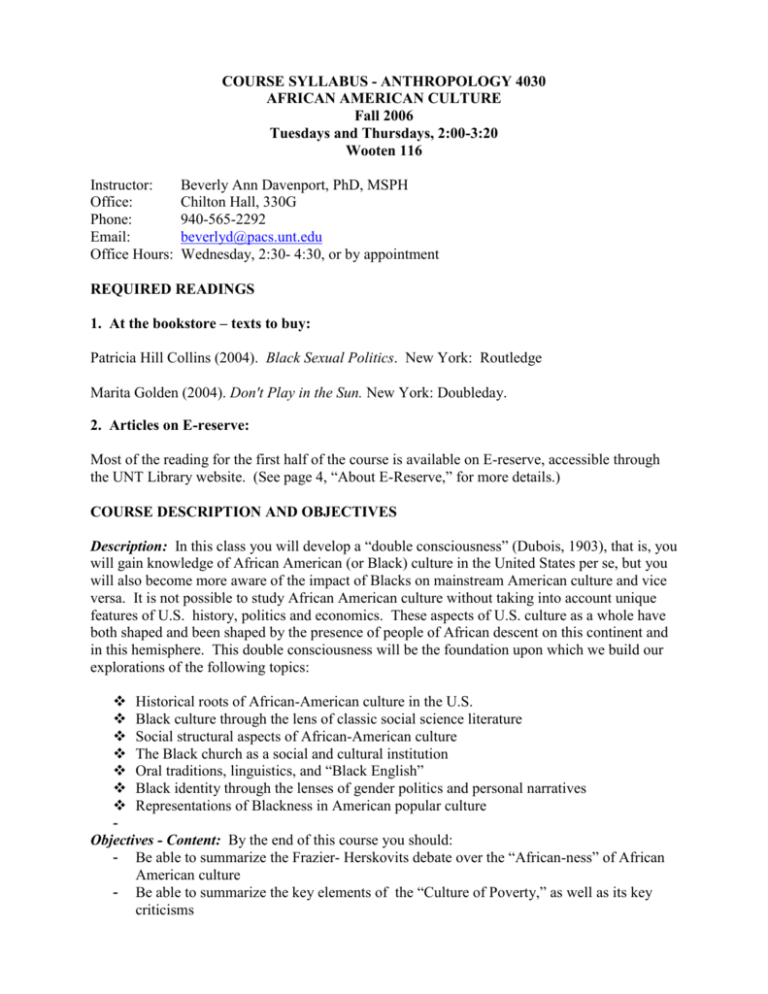
COURSE SYLLABUS - ANTHROPOLOGY 4030 AFRICAN AMERICAN CULTURE Fall 2006 Tuesdays and Thursdays, 2:00-3:20 Wooten 116 Instructor: Office: Phone: Email: Office Hours: Beverly Ann Davenport, PhD, MSPH Chilton Hall, 330G 940-565-2292 beverlyd@pacs.unt.edu Wednesday, 2:30- 4:30, or by appointment REQUIRED READINGS 1. At the bookstore – texts to buy: Patricia Hill Collins (2004). Black Sexual Politics. New York: Routledge Marita Golden (2004). Don't Play in the Sun. New York: Doubleday. 2. Articles on E-reserve: Most of the reading for the first half of the course is available on E-reserve, accessible through the UNT Library website. (See page 4, “About E-Reserve,” for more details.) COURSE DESCRIPTION AND OBJECTIVES Description: In this class you will develop a “double consciousness” (Dubois, 1903), that is, you will gain knowledge of African American (or Black) culture in the United States per se, but you will also become more aware of the impact of Blacks on mainstream American culture and vice versa. It is not possible to study African American culture without taking into account unique features of U.S. history, politics and economics. These aspects of U.S. culture as a whole have both shaped and been shaped by the presence of people of African descent on this continent and in this hemisphere. This double consciousness will be the foundation upon which we build our explorations of the following topics: Historical roots of African-American culture in the U.S. Black culture through the lens of classic social science literature Social structural aspects of African-American culture The Black church as a social and cultural institution Oral traditions, linguistics, and “Black English” Black identity through the lenses of gender politics and personal narratives Representations of Blackness in American popular culture Objectives - Content: By the end of this course you should: - Be able to summarize the Frazier- Herskovits debate over the “African-ness” of African American culture - Be able to summarize the key elements of the “Culture of Poverty,” as well as its key criticisms - Be conversant with the names and ideas of some of the key thinkers in the field Understand and be able to articulate the social structural variables that impact Black culture Be able to articulate the role of the church in U.S. Black communities Have a basic grasp of linguistic terms associated with Black English/Ebonics Be able to identify cultural elements of style in oral traditions associated with AfricanAmerican culture Understand and be able to articulate the different sides of the argument surrounding Black English Understand the impact of “colorism” within Black culture Be able to critically analyze representations of African Americans in the media Be able to discuss the power of media representations on Black self-identity Objectives – Process: Though I will lecture as needed, this is a DISCUSSION-BASED class. There is experiential knowledge that you, as American “culture-bearers” and/or as “participantobservers” of American culture bring to the class. Your job during this semester will be to share what you know and/or have experienced, but also to learn to be aware of your tacit assumptions, the taken-for-granted way of seeing things that may distort your understanding of the materials we will be studying in this class. My job as the instructor is to bring those assumptions to the fore, and to notice my own assumptions and model for you how I try to challenge them. I want you to learn how to think critically about what you are reading. It is not holy writ; these are ideas that can be challenged but which must be challenged thoughtfully. Your feelings matter here, but your feelings must be backed up by your thoughts. It is OK to “not like” or “like” something, that’s only the beginning. You have to make yourself go a little bit deeper and explain to yourself (and occasionally to me) WHY you like or don’t like something by creating an intellectual framework for your ideas. How does what you are reading relate to something else you have been thinking about? By the end of the course I expect that: 1) You will have participated in class. I will do my best to find ways to make it possible for everyone to feel comfortable about speaking in class. (Discussing ideas from the reading is an important practice – it helps you to learn and it sharpens your critical thinking skills.) 2) You will be a more ACTIVE READER, asking questions of the assigned reading and making connections to other sources of information, building on your existing knowledge. In order to hone your skills as a critical thinker and active reader, I expect you to have completed the reading assignments BEFORE class. 3) You will have become comfortable with regular writing assignments. I will be guiding you with step by step assignments along the way to the final project because my goal here is to demystify the research and writing processes. Though attendance is not mandatory, listening to and participating in class discussion (not to mention taking notes!) will make a big difference in what you get out of this class. Therefore, I urge you to attend class regularly. I won’t have much sympathy for a poor performance on exams if I haven’t seen you in class very often. 2 COURSE REQUIREMENTS Exams: There will be an in-class midterm and a take-home final examination. The format will be short answer and essay questions, with material coming from assigned readings, class discussion and class lectures. The take-home final will be comprehensive, but will stress materials from the second half of the course. Final Project: [Important note: please see “Anthropology Department Plagiarism Policy, page 5] There are three options for the final project for this class. I would like you to decide which option you are electing by the end of the second week of class (September 7). By September 21, I also want to have met individually with each of you to assist with your selection of a project topic. In an effort to encourage thoughtful work, I will be both guiding you with step-wise through the research tasks and asking you to provide evidence of specific steps you are taking to work on this project at about bi-weekly intervals. These checkpoint dates are on the syllabus. No matter which option you select, the written assignment must be handed in on the last day of class, Thursday, December 7. Option 1 - 10-15 page research paper: you will write a well-reasoned and constructed research paper on a topic of African American culture of interest to you. Option 2 - Oral history/Field research: You will conduct a “mini-ethnography” of some aspect of current day African-American culture and write a 10-15 page paper. Option 3 - In-class presentation (late November/early December): You may choose to present your research as an in-class presentation. Because I want to include current day aspects of popular culture in this class, including for example, hip-hop and/or rap music, these might be especially well suited for in-class presentations. Please note that this option will require as much research as the other two options, but your presentation outline, your PowerPoint slides and a short paper (3-4 pages) evaluating the process of doing the presentation and which includes your bibliography will be what you hand in. Other writing assignments: I will assign short additional writing assignments pertaining to topics under discussion in the class. STUDENT EVALUATION In class midterm: Take-home final: Final project: Short writing assignments: 25% 35% 30% 10% CLASSROOM COMMUNITY In order for discussions to be most useful, I encourage you to ask questions and make comments, or email me questions (if that makes you more comfortable) which I will address at the next available class time. There is no such thing as a stupid question. The only thing that is stupid is NOT TO ASK a question when you have one. I want to make the classroom feel like a safe place for you to raise ideas and questions. We are ALL LEARNERS TOGETHER. 3 During classroom discussions, I want to get to know you, so I ask you to remember as much as possible to say your name (at least for the first month or so) before you start in on your comment. Also, I would like you to TALK TO EACH OTHER – not just to me. There will be more to say on this topic as the semester proceeds. Cell phones, pagers, text messaging systems must be OFF during class. No exceptions, not even me. Ground Rules for Class Discussion: 1. 2. 3. 4. 5. 6. Treat opinions with courtesy Focus on IDEAS; do not attack INDIVIDUALS. Listen to what people are saying – this is easier said than done. In order to facilitate, I ask that you re-phrase previous speaker’s comments before making your remarks. Try to remember the NAMES of your classmates when you are referring to their remarks. You have the right to participate or not participate as you see fit; you should not feel “shut down” by any comments. My job is to moderate/facilitate the discussion and keep it safe for everyone, even if we are talking about topics that are uncomfortable. ABOUT E-RESERVE This system significantly reduces the cost to you because by not creating a print copy of a “course reader,” you don’t have to pay the copyright fees associated with reproducing previously printed material. The only cost to you is the cost of printer ink and paper necessary to print out these articles. YOU MUST PRINT OUT ARTICLES BECAUSE I WILL EXPECT YOU TO BRING THE DAY’S READING TO CLASS IN ORDER TO EASILY REFER TO IT DURING CLASS DISCUSSION. If you three-hole punch them and keep them together in a notebook, you will save yourself endless pain when you are studying for the midterm and/or writing your final examination. How To Access E-Reserve Articles: 1. From the library catalogue web page, http://iii.library.unt.edu/ , click the “COURSE RESERVES” button (upper middle right side of the screen). 2. From the course reserves page, type in ANTH 4030 then, hit “Enter” on your keyboard or click on the search button on the screen. 3. The entire set of readings that has been placed on e-reserve will come up. Please note the library has listed these articles in alphabetical order by TITLE. Please look for both author and title when you select the article you wish to download. Once you have selected the right article, click on it, and you will be taken to the “Course Reserves Verification” page. 4. Follow the instructions on the “Course Reserves Verification” page. The password for the class is “davenport” (all lower case). Click on “Submit” and you will be taken to a PDF version of the document you’ve selected. 4 Note if you are a first time user of E-reserve, you should leave the PIN field blank. After you click on submit, you will receive a prompt to create a PIN. Once your PIN created, you’ll follow the steps as above. WEBCT/VISTA These items are (or will be) posted on WebCT/Vista: - Course syllabus - Calendar with important dates highlighted - Grades when they become available - Special announcements as necessary throughout the term INFORMATION FOR STUDENTS SEEKING ADA ACCOMMODATION Please give me your official “Request for Accommodation” letter during the first week of class. Please plan to come to see me during my office hours (or make an appointment) as early in the semester as possible so that we can make sure that all reasonable steps are being taken to maximize your learning opportunities in the class. Anthropology Department Undergraduate Plagiarism Policy: The Department of Anthropology does not tolerate plagiarism, cheating, or helping others to cheat. Students suspected of any of these will be provided the opportunity for a hearing; a guilty finding will merit an automatic “F” in the course. In addition, I reserve the right to pursue further disciplinary action within the UNT legal system, which may result in dismissal from the university. Plagiarism is defined as misrepresenting the work of others (whether published or not) as your own. It may be inadvertent or intentional. Any facts, statistics, quotations, or paraphrasing of any information that is not common knowledge, should be cited. For more information on paper writing, including how to avoid plagiarism, and how to use citations, see http://www.unt.edu/anthropology/writing.htm. For information on the University’s policies regarding academic integrity and dishonesty, see the UNT Center for Student Rights and Responsibilities, http://www.unt.edu/csrr/. DETAILED COURSE OUTLINE UNIT I: HISTORICAL ROOTS OF AFRICAN AMERICAN CULTURE Tuesday, August 29 - Introduction to course and each other No assigned reading for today. Thursday, August 31 – Culture – What are we talking about? Luke Lassiter (2006). “Anthropology and Culture,” pp. 37-66. FROM Invitation to Anthropology, 2nd edition. Lanham, MD: Altamira Press. (E-reserve) Tuesday, September 5 – Overview African origins/slavery in the U.S. Howard Zinn (2007). “Drawing the Color Line,” pp. 9-20. IN Charles A. Gallagher, ed., Rethinking the Color Line, 3rd edition. Boston: McGraw-Hill (E-reserve) 5 Thursday, September 7 – Making the connection/The Gullah people Final project checkpoint 1 – hand in a page indicating which option you are choosing Joseph A. Opala (1987). The Gullah: Rice, Slavery and the Sierra Leone-American Connection. http://www.africanaheritage.com/Gullah_and_Sierra_Leone.asp, pp. 1-19. (Access on-line) Movie: “The Language You Cry In.” UNIT II: AFRICAN AMERICAN ANTHROPOLOGY – HISTORIC VIEWS Tuesday, September 12 – Herskovits/Frazier Debate, Part I - Herskovits Melville Herskovits (1945). “Problem, Method and Theory in Afroamerican Studies,” pp. 140162. IN: George Eaton Simpson (1973), Melville Herskovits. New York: Columbia University Press. (E-reserve) Norman Whitten and John Szwed (1970). “Introduction,” pp. 23-30. FROM: N. Whitten and J. F. Szwed, editors. African American Anthropology, New York, The Free Press. (E-reserve) Thursday, September 14 – Herskovits/Frazier Debate, Part II - Frazier Anthony Platt (2001). “Introduction to E. Franklin Frazier, The Negro Family in the United States,” pp. vii-xxix. IN: E. Franklin Frazier (2001 [1939]), The Negro Family in the United States. Notre Dame, IN: University of Notre Dame Press. (E-reserve) Tuesday, September 19 – Early Studies of the Black Family Paula Giddings (1984). Chapter XVIII, "Strong Women and Strutting Men: The Moynihan Report," pp. 325-335. FROM: When and Where I Enter: The Impact of Black Women On Race and Sex in America. New York, Bantam Books. (E-reserve) Carol Stack (1970). “The Kindred of Viola Jackson: Residence and Family Organization of an Urban Black American Family,” pp. 303-311. IN: N. Whitten and J. F. Szwed, African American Anthropology. New York, The Free Press. (E-reserve) Thursday, September 21 – More on the Black Family Final project checkpoint 2 – have you come to my office hours to discuss your project yet? Robert Hill (2001). “Race, Class, and Culture: Common Pitfalls in Research on African American Families,” pp. 99-123. IN: Ura J. Bailey and Lorenzo Morris, editors, One-Third of a Nation: African American Perspectives. Washington, DC: Howard University Press (Ereserve) 6 UNIT III: POLITICAL ECONOMIC PERSPECTIVES Tuesday, September 26 – The Culture of Poverty Oscar Lewis (1970). “The Culture of Poverty,” pp. 67-80. IN: Anthropological Essays. New York: Random House. (E-reserve) Philippe Bourgois. (2001). “Culture of Poverty,” pp. 11904-11907. IN: International Encyclopedia of the Social and Behavioral Sciences, Volume 17. Amsterdam: Elsevier Press. (E-reserve) Thursday, September 28 – The Effects of Segregation Final project checkpoint 3 – Hand in the narrowed down version of your research question, 1 page. What questions are you asking yourself about how to refine this topic? Douglas Massey and Nancy Denton (1993). “The Continuing Causes of Segregation,” pp. 235249. FROM: Thomas Shapiro (ed.), Great Divides: Readings in Social Inequality in the U.S., 3rd edition. Boston: McGraw-Hill (E-reserve) Douglas Massey and Nancy Denton (1993). “The Perpetuation of an Underclass,” FROM: American Apartheid. Cambridge: Harvard University Press (E-reserve) Tuesday, October 3 Catch-up/Review for Midterm Thursday, October 5 – MIDTERM EXAMINATION Tuesday, October 10 – SPECIAL CLASS ON LIBRARY RESEARCH TO BE HELD IN WILLIS LIBRARY, LOCATION TO BE ANNOUNCED. Guest Speaker: Monika Antonelli. UNIT IV: SOCIAL AND CULTURAL MEANINGS OF THE BLACK CHURCH Thursday, October 12 – Community institution/political base/The Movement St. Clair Drake and Horace Cayton (1993 [1945]). “The Grip of the Negro Church,” pp. 412-429. IN: Black Metropolis: A Study of Negro Life in a Northern City, revised and enlarged edition. Chicago: University of Chicago Press. (E-reserve) Lawrence Jones (2001). “The African American Churches: In History and Context,” pp. 165186. IN: Ura J. Bailey and Lorenzo Morris, editors, One-Third of a Nation: African American Perspectives. Washington, DC: Howard University Press (E-reserve) VIDEO: “We shall not be moved” 7 Tuesday, October 17 – The other side of the black church – black church and homophobia Final project checkpoint 4 – Starting the search – please give me a bibliography of at least six sources you are considering using for your project Patricia Hill Collins (2004). pp. 105-114 IN: Black Sexual Politics. New York: Routledge Press. (Required text) UNIT V: ORAL TRADITIONS/LINGUISTICS/BLACK ENGLISH Thursday, October 19 – Oral Traditions *Hurston, Zora Neale (1978[1935]). Of Mules and Men. Skim: “Introduction,” by Robert Hemenway, pp. xi-xxviii, Read: Introduction by Hurston, pp. 3-10, “Ole Massa and John Who Wanted to Go to Heaven,” pp. 75-78. (E-reserve) Tuesday, October 24 – Linguistics in a nutshell Smitherman, G. (1999). Talkin that talk: Language, Culture, and Education in African America. London, Routledge. Chapter 1, “Introduction to Ebonics,” pp. 19-40 (E-reserve) Thursday, October 26 – Verbal styles - preachers Final project checkpoint 5 – If you’re doing fieldwork, you should be wrapping it up by now. Everybody: 1 page status report. John Rickford and Russell Rickford (2000). “Preachers and Pray-ers,” pp. 39-57 IN: Spoken Soul: The Story of Black English. New York: John Wiley & Sons. (E-reserve) Tuesday, October 31 – Verbal styles – Signifying and more John Rickford and Russell Rickford (2000). “Singers, Toasters and Rappers,” pp. 73-88. IN: Spoken Soul: The Story of Black English. New York: John Wiley & Sons. (E-reserve) Thursday, November 2 – The Politics of Language Use John Lahr (1997). “Speaking Across the Divide,” pp. 35-42, The New Yorker, January 27, 1997. (E-reserve) UNIT VI – IDENTITIES AND REPRESENTATIONS Note: From this point on, start reading Marita Golden’s book, Don’t Play in the Sun. There will be a final exam question that asks you to think about material presented in this book in relation to the material in this course. Tuesday, November 7 – Old Hurts: The Color Complex Kathy Russell et al. (1992). “Black Identity: Shades of Beauty and Pride,” pp. 62-80 IN: The Color Complex: The Politics of Skin Color among African Americans. New York, Doubleday (Anchor Books). “(E-reserve) 8 Kathy Russell et al. (1992). “The Media: Images in Black and Light,” pp. 135-162 IN: The Color Complex: The Politics of Skin Color among African Americans. New York, Doubleday (Anchor Books). (E-Reserve) Video: “A Question of Color” Thursday, November 9 – Introduction to Representations and Identities Final project checkpoint 6 – Hand in a 2-page outline of your paper as you have conceptualized it at this point. Patricia Hill Collins (2004). Skim ‘Introduction,” pp. 1-21; Read Chapter 1, pp. 22-52 IN: Black Sexual Politics: African Americans, Gender, and the New Racism. New York, Routledge Press. (Required Text) bell hooks (1995). “Black Beauty and Black Power: Internalized Racism,” pp. 119-132 IN: Killing rage: ending racism. New York, Henry Holt & Company. (E-Reserve) Tuesday, November 14 – Historical Representations, Media Representations Patricia Hill Collins (2004). Read Chapter 2, “The Past is Ever Present” pp. 53-85 IN: Black Sexual Politics: African Americans, Gender, and the New Racism. New York, Routledge Press. (Required Text) Jacquie Jones (1993). “The Construction of Black Sexuality,” pp. 247-256. FROM: Manthia Diawara, ed., Black American Cinema. New York: Routledge Press (E-Reserve) Thursday, November 16 – No class Tuesday, November 21 – Constructions of Gender: Women Final project checkpoint 7 for everyone –Hand in a one page status report Patricia Hill Collins (2004). Chapter 4, “Get Your Freak On: Sex, Babies and Images of Black Femininity,” pp. 119-148 IN: Black Sexual Politics: African Americans, Gender, and the New Racism. New York, Routledge Press. (Required Text) Thursday, November 23 HAPPY THANKSGIVING! Tuesday, November 28 – Constructions of Gender: Men Final project checkpoint for class presenters: what do you need in the way of multi-media help? Hand in a status report Patricia Hill Collins (2004). Chapter 5, “Booty Call: Sex Violence and Images of Black Masculinity,” pp. 149-180 IN: Black Sexual Politics: African Americans, Gender, and the New Racism. New York, Routledge Press. (Required Text) 9 Majors, R. and J. M. Billson (1992). Cool pose: the dilemmas of black manhood in America. New York, Lexington Books (An Imprint of Macmillan, Inc.). Chapter 1, “Cool Pose: Expression and Survival,” pp. 1-9 and Chapter 5, “The Genesis of Black Masking,” pp. 55-66. (E-Reserve) Thursday, November 30 – Reconstructing Gender Identities from the Inside Out Patricia Hill Collins (2004). Chapter 6, “Very Necessary: Redefining Black Gender Ideology,” pp. 181-212 IN: Black Sexual Politics: African Americans, Gender, and the New Racism. New York, Routledge Press. (Required Text) Tuesday, December 5 FINAL PROJECT PRESENTATIONS Thursday, December 7 FINAL PROJECT PRESENTATION PICK UP TAKE HOME FINAL EXAM FINAL PROJECTS DUE IN CLASS Tuesday, December 12 FINAL EXAMINATION DUE DELIVER TO ANTHROPOLOGY DEPARTMENT BY 4:30 PM – NO EMAILS! 10
